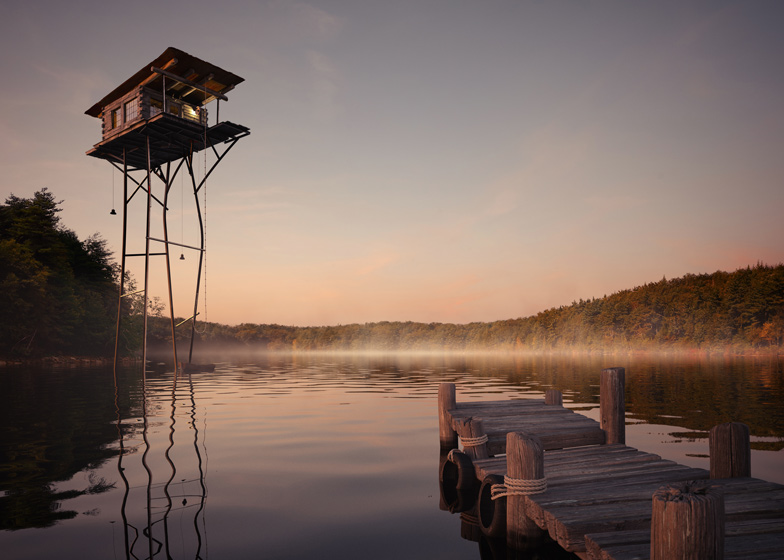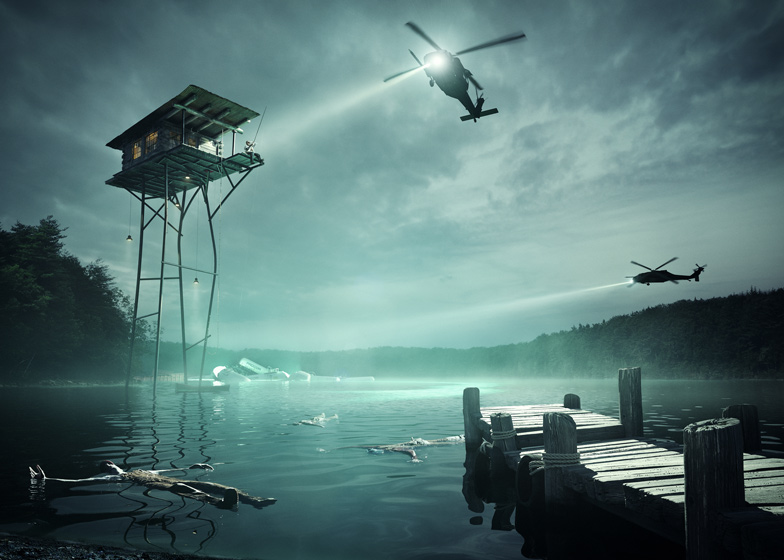Seattle studio Olson Kundig Architects has produced visualisations imagining the fictional scenes before and after a freight train carrying toxic chemicals haphazardly plunged into a lake where artist Jack Daws was building a house on stilts (+ slideshow).
As part of a project entitled The House That Jack Built, Olson Kundig's images accompany an account written by Jack Daws of an imaginary series of events whereby the artist tried to build an enticing retreat, but ended up with a refuge in a perilous environment.
The story tells of how Daws had become disillusioned by architects' invasion of the art world and reacted by trying his hand at architecture.
Inspired by the houses of Seattle architect Tom Kundig, the artist planned a cabin at the centre of Walden Pond, Massachusetts, and built it on 24-metre stilts using tiles and rails pilfered from a local railway. This action destabilised the railway and led to the crash of the train.
Images and a model of the building are on show in the Mercer Gallery of Walden 3 in Seattle, presented as if the events genuinely took place.
"The installation is meant to be a starting point for self-reflection and a critical inquiry into contemporary society, engaging such topics as reincarnation, artistic attribution, admiration, false identity, thievery, tribute, injury and environmental degradation to ruin," reads the exhibition text.
The fictional tale also extends to the exhibition opening, where architect Kundig is reported to have taken a punch at Daws over the attempt to rip off his style. This scene is also visualised in a rendering.
The House That Jack Built is the first project by Olson Kundig Outpost, the firm's new visualisation studio, and forms part of the Itinerant Projects series of collaborations between the architects and various site-specific artists.
Here's more information from Jack Daws and Olson Kundig Architects:
The House That Jack Built
Conceptual artist Jack Daws, in conjunction with Olson Kundig Outpost, present a new work entitled The House that Jack Built. The work will be featured at the Mercer Gallery at Walden Three from January 17 through March 16, 2014.
The House that Jack Built is based upon The Pond (a somewhat mystical account of my foray into architecture), Daws’ firsthand account of his efforts to build a cabin in the middle of Walden Pond only to have a freight train loaded with toxic chemicals plunge into its waters. The installation includes Daws' story, a large-scale model of the cabin, and accompanying images depicting the pond before and after the environmental disaster. The installation is meant to be a starting point for self-reflection and a critical inquiry into contemporary society, engaging such topics as reincarnation, artistic attribution, admiration, false identity, thievery, tribute, injury and environmental degradation to ruin.
For Daws, and ultimately the subject of this exhibition, trouble began when he acted upon his growing irritation at architects for steadily eroding the boundaries of art and for taking art commissions he believes should be reserved for artists. His defiance led him to try his hand at architecture, and designing and building his own cabin - taking inspiration from the work of noted Seattle architect, Tom Kundig. Daws positioned his cabin, made from pilfered railroad ties and rails from a nearby railway, atop 80-foot steel rails in the middle of Walden Pond. Tragically, his theft of the rails led to the devastation of Walden Pond. In the post-accident image included in the exhibition, the wreckage of a freight train carrying toxic waste is shown spilling its contents into the idyllic setting.
Known to bend rules, Daws has made his mark challenging authority and tackling complex social issues. With The House that Jack Built, Daws threatens to challenge the boundaries of what an artist should be doing, and the territory they have no business meddling in. "I don’t care what my detractors think," said Daws. "La historia me absolverá." Greg Lundgren, executive director of Walden 3 adds, "Walden 3 prides itself on encouraging the artists it presents to take risks and challenge conventional wisdom. We do not censor their work or discourage their passions. But Jack took us to the absolute end on this one."
Two new ventures for Olson Kundig Architects have supported this installation: Itinerant Projects is the firm’s new installation program which will locate four migratory collaborations in site-specific installations across the globe; and Olson Kundig Outpost, a new creative production studio that supported Mr. Daws with photography and visual effects.


